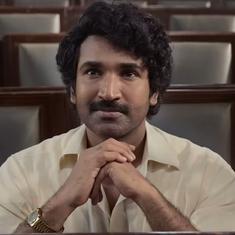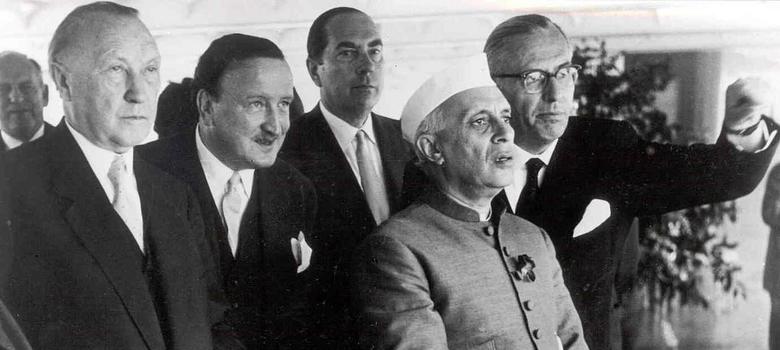“You are able to discard your halo occasionally. You are capable of saying, ‘when I saw the sea for the first time’ when others would say ‘when the sea saw me for the first time…’. I should like to have known you better. I am always attracted to people who are integral enough to be inconsistent without discrepancy and don’t trail vicious threads of regret behind them. You are not hard. You have got a mellow face. I like your face, it is sensitive, sensual and detached at the same time.” – Amrita Shergill
It is heart-warming to see that “mellow, sensual and detached” face on posters on the streets of Delhi after a long time. There is something soothing about it replacing that boastful, nationalist gaze that had been looking down on us for the last two years. Bihar could not stand that image. India would do well to follow Bihar’s lead.
2015 could well be the year of Nehru’s return. Just when the final death of Nehru was being announced in India’s political and intellectual circles, the nation seems to have turned back to him, reposing faith in the secular politics of anti-majoritarianism. Just when secularism was thought to be replaced by development, it became the fulcrum of the electoral discourse in Bihar.
Rahul Gandhi recently declared that his real fight was against the ideology of the Rashtriya Swayamsevak Sangh. Lalu Prasad Yadav, who never invokes Nehru while describing his political lineage, performed a Nehruvian task when he made electioneering in Bihar an occasion to alert people against the dangers of Sangh ideology. The Bharatiya Janata Party was no party, he said, it was a mask of the RSS. And the politics of the RSS has no place in a diverse and plural society like India.
Majoritarian communalism
Secularism has long been portrayed as a sin that needs to be exorcised from the Indian body politic. If this is to be achieved, it is said, the name of the architect of secularism, Nehru, must be erased from the national memory. Nehru would have laughed at the interpretation. He would have called secularism an invention of MK Gandhi, reminding people of what his guru said in the blood soaked days of 1946-47: “In India, I am pro-Muslim and in Pakistan, pro-Hindu.”
Right till the end, Nehru warned against the dangers of majoritarian communalism. In 1964, in his last meeting with the secretaries of the government of India, someone talked about the danger of communism. Communism was not a threat to India, he said, the real menace was majoritarian communalism. On another occasion, he declared, “India tolerates everybody and everything including mad men, they also exist and carry on…but…their [communalists’] trend of thought is a dangerous one. It is a trend full of hatred.”
His opposition to majoritarian communalism has been portrayed as evidence of him being anti-Hindu, anti-religion. The intellectuals who supported this pedestrian understanding critiqued his modernising mission, arguing that it uprooted people from their religious moorings.
Nehru, in fact, had no quarrel with religion: “Science…challenges the old concepts of religion. But if religion deals not with dogmas and ceremonials, but rather with the higher things of life, there should be no conflict with science or inter se between religions.”
Living life on a higher plane, being wary of the materialistic race, these were recurring themes in Nehru’s speeches and writings even when the subject was planning or science or industry. He wrote:
“Economic progress is essential…but a doubt creeps into our minds. Is this by itself enough or is something else to be added to it? Whether religion is necessary or not, a certain faith in a worthwhile ideal is essential to give substance to our lives and to hold us together... What I am concerned with is not merely our material progress, but the quality and depth of our people. Gaining power through industrial progress, will they lose themselves in the quest of individual wealth and soft living. That would be a tragedy.”
How can this tragedy be averted? For this, it was important to be true to “those essential principles for which India has stood in the past through the ages”. The search for these principles “leads to... Vedantic conception that everything, whether sentient or insentient, finds a place in the organic whole: that everything has a spark of… the divine impulse or the basic energy or life force which pervades the universe”.
And how do we seek out this essential goodness that all of us are capable of? Only by realising that the fundamental question we need to direct our attention to is “what is the meaning of life?”.
'This was a man'
Those who don’t understand Nehru have presented him as a hardcore materialist who was only concerned with economics. They list only Indian Institutes of Technology, Indian Institutes of Managements, dams and industries as his contribution. They don’t realise that he was looking for something else: “In order to give the individual and the nation a sense of purpose, something to live for and if necessary die for, we have to revive some philosophy of life and give, in the wider sense of the word, a spiritual background to our thinking.”
Once addressing the National Science Congress, he expressed his apprehension that science might itself turn into a kind of dogma. He was for science, but against scientism. He refused to abstract the individual into mass. At the same time, he said, “The touchstone... should be how far any political or social theory enables us, the individual, to rise above his petty self and thus think in terms of the good of all.”
Transcendence, going beyond oneself are preconditions to achieve goodness in Nehru’s view. He called himself a pagan.
Hiren Mukherjee, the communist leader, saw Nehru as a character, “built not in the monistic manner of most revolutionaries, but with a tendency towards eclecticism, a tolerance of diversity and a hesitation to make up his mind over many things – perhaps all Indian characteristics, for did not our ancient seers, seeking definition, often exclaim: ‘not this, not this?’”
Mukherjee asserted that Nehru couldn’t be faulted for not being a maker of history for he lacked the crudity necessary for it. Writing long before him, Rabindranath Tagore had said, “He is entitled to be judged by history in the light of what he did and sought further to do to free the minds of men and set them in movement, to release his people from the grip of narrow nationalism and choking allegiances that diminished man.”
In a land full of self-aggrandising, one-dimensional figures, Nehru, who was “inconsistent without discrepancy”, looks incomprehensible. The best tribute to him, again, came from Mukherjee who employed the words of Shakespeare:
His life was gentle, and the elements
So mixed in him that nature might stand up
And say to all the world, “This was a man!”










